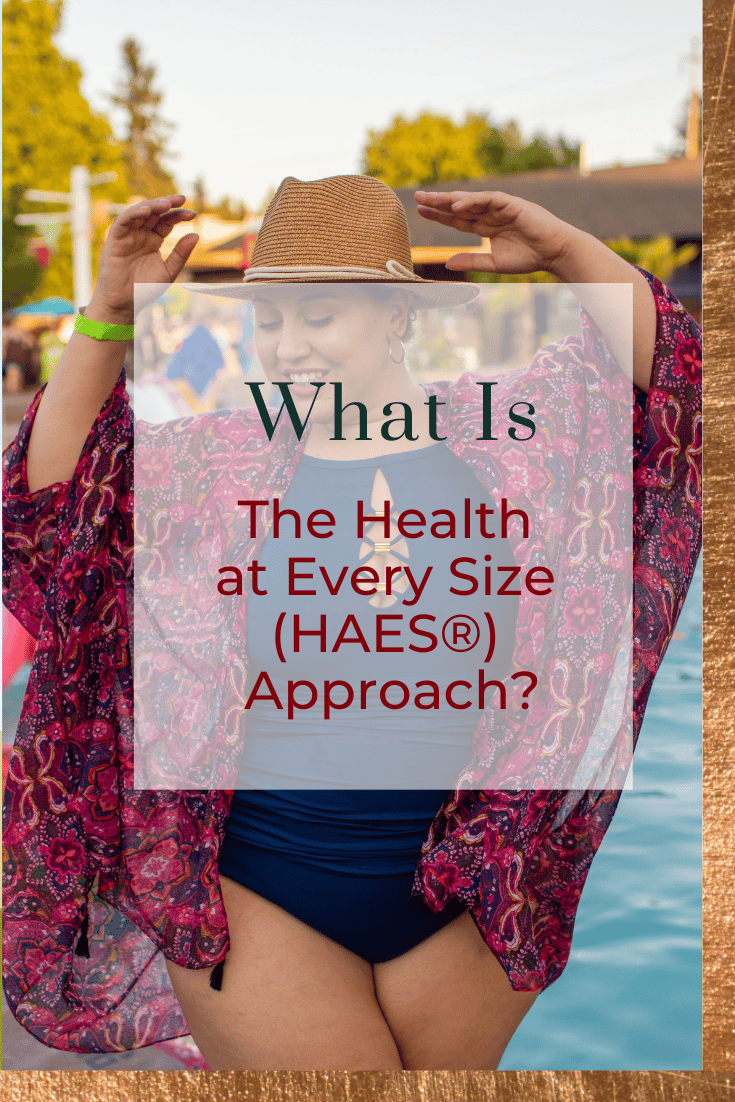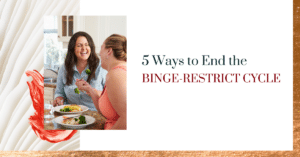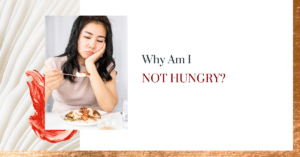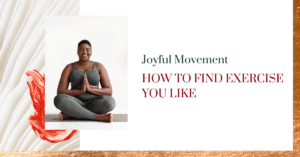What is the Health at Every Size (HAES®) Approach?

The Health at Every Size (HAES®) approach to health is an alternative to the widely accepted weight-centric approach. In this post, we’ll explore the answer to the question: What is Health at Every Size (HAES)? by examining the pitfalls of the weight-centric approach, outlining the crux of the Health at Every Size approach, and detailing why it is a more holistic, inclusive health framework. Plus we’ll talk about how to face our resistance to ideas that may challenge our existing beliefs.
This post contains edited excerpts from my book, Unapologetic Eating: Make Peace with Food and Transform Your Life.

The Problem with the Weight-Centric Approach
The conventional approach to health is what we call weight-centric, meaning body weight is seen as a primary determinant of health and weight management (i.e., weight loss and the maintenance of a “normal” body mass index) is emphasized when promoting health and well-being.
In a weight-centric healthcare system, a person who goes to the doctor for any type of medical issue is usually evaluated first based on their weight, regardless of whether their weight is relevant to what they are presenting with. A weight-centric or weight-normative approach assumes that weight and disease are related in a linear fashion and places an emphasis on “personal responsibility” for diet-, exercise-, and other health-related choices and outcomes (i.e., healthism). In this approach, a “normal” body mass index is conflated with health, whereas an “overweight” or “obese” body mass index is conflated with disease.
Our culture’s current approach to health means that from a nutrition perspective, the focus is put on restricting calories in order to lose weight. This stems from the assumption that thinner = healthier. However, as I’ve explored in past posts, the research (not to mention clinical experience and people’s lived experiences) have shown that the weight-centric approach to health does not actually result in better health (especially when compared to a weight-inclusive approach).
Here are a few reasons why we need to reassess the weight-centric approach:
1. Weight loss is rarely effective long-term. The research studies that show weight loss methods as being “effective” are typically only following people for several months or at most a year or two. While it is common for people on weight-loss diets (sometimes framed as “lifestyles”) to lose weight for the first six months or so, by the five-year mark, up to 95% of people will have regained all, if not more, of the weight.1
2. Focusing on weight perpetuates stigma. When we focus on people’s weight being the problem and make assumptions about them based on their weight, they are marginalized which has an even greater effect on their health than what they weigh. The chronic stress weight stigma causes is extremely problematic for people’s bodies and health. Experiencing weight stigma contributes to increased blood pressure, chronic inflammation, diabetes, cardiovascular disease, anxiety, depression, low self-esteem, and disordered eating behaviors.
3. Weight cycling is an independent risk factor for disease. Repeated cycles of intentional weight loss followed by unintentional weight gain (also known as yo-yo dieting or weight cycling), is also very common among dieters. This pattern of repeatedly losing and regaining weight increases the risk of heart disease, high blood pressure, diabetes, chronic inflammation, certain forms of cancer, and even death. Weight cycling is an independent risk factor for poor health outcomes, which means that losing and regaining weight is worse for a person’s health than staying at a higher weight. Weight cycling – along with weight stigma – may explain some, if not all, of the increased disease risk and poor health outcomes we see in people who have a higher BMI. (2, 3, 4)
4. Dieting increases the risk of disordered eating and eating disorders. With the cultural focus on weight loss and dieting, people developing rigid rules around food and what they can or cannot eat. This rigidity is linked to a higher risk of disordered eating and eating disorders. A 2008 survey found that 65% of women aged twenty-five to forty-five had some form of disordered eating, and another 10% met the criteria for eating disorders. That means 3 out of 4 women eat, think, or behave abnormally around food. This includes things like skipping meals, restricting certain foods or food groups, binge eating, or feeling guilty or out of control around food. Some of these things are so normalized by our society, but in reality, these behaviors are anything but “normal”. Although not all dieters progress to eating disorders, the majority of people diagnosed with an eating disorder have a history of dieting.
5. Bodies fight to keep within a certain individualized weight range. Not everyone is meant to have a BMI in the “normal” range (remember that the differences in BMI categories are mostly arbitrary). Everyone’s set point weight range is different. For many people, their set point weight falls on the higher end of the spectrum, into the “overweight” or “obese” BMI categories. This is completely normal. We are not all meant to have the same size body, just as we are all not meant to have the same height, foot size, or hair color. Body size diversity is inherent within a population and is something that we can—and should—respect rather than trying to change.
It’s important to note that I am not saying weight gain itself is bad, nor is the inability to lose weight a problem. Despite what our society has programmed us to believe, fat bodies are not bad.
Focusing on weight detracts from the real source of health problems and can promote unhealthy behaviors related to food and exercise.
So, if we don’t focus on weight, how do we go about measuring and promoting health?
An Alternative: What is Health at Every Size (HAES®)?
One approach that can be useful to take the focus off of weight is the Health at Every Size® framework (HAES®). The HAES approach is a registered trademark of the Association for Size Diversity and Health, a nonprofit that began in 2003 to promote size acceptance and end weight discrimination and stigma. But the tenets of the HAES framework had been around for decades in the work of fat activists and the fat liberation movement that began in 1960.
When we think of health risks people can change, their behaviors – not their weight – have the biggest impact on health. It is important to remember that weight is not a behavior. Eating nutritious foods and exercising more positively impact markers like blood sugar, heart rate, and blood pressure even without any weight loss. The challenge is that, because of the widespread emphasis on weight loss above all else, when people make beneficial behavior changes and don’t see weight loss, they think that what they are doing isn’t working and then they stop practicing these beneficial behaviors.
The HAES framework offers an alternative to the weight-centric model of care. It rejects the use of weight or BMI as a proxy for health and instead works to support people of all sizes in finding compassionate ways to take care of themselves, no matter what their size. The focus is on health and well-being, rather than weight, and promotes positive physical and mental health behaviors through five principles:
- Weight inclusivity
- Health enhancement
- Respectful care
- Eating for well-being
- Life-enhancing movement
HAES emphasizes accepting and respecting all bodies of all sizes and promotes health policies that give better access to care, end weight stigma, and encourage people to engage in intuitive eating and enjoyable movement practices. When it comes to improving health and health outcomes, the HAES approach works: it is associated with improved cholesterol, lower blood pressure, no weight cycling, better body image, and increased physical activity.
Two last notes:
One, the approach is Health at Every Size – not Healthy at Every Size. Health at Every Size does not mean that everyone, in every size body, is healthy. What it does mean is that everyone, regardless of their body size, can be working on health-related goals without focusing on changing their body size.
Two, it’s important that we do not fall into the belief of healthism – that is, the idea that everyone “should” prioritize health, and if they’re not, then they’re a “bad” person. More to come on healthism soon – keep an eye out for my next blog post!
Challenging Our Existing Beliefs
When you have spent your whole life believing and practicing a certain way, it can be really hard, not to mention frightening and unsettling, to question it. This may be how you’re feeling while reading this post. So, the first thing I suggest you do is to take a nice deep breath. Send yourself some compassion for these feelings and accept that there will be some discomfort. A willingness to question our beliefs is an important sign of growth, no matter how powerful those beliefs are. The more you question your beliefs, the closer you get to figuring out who YOU are underneath what society has taught you.
If you want to lose weight or are afraid of gaining weight, that is normal – and I do not mean for this post to be shaming in any way. It’s okay to understand and even believe in the concepts in this post and to simultaneously feel the desire to change your body. You might find it helpful to explore this blog on how to navigate the fear of weight gain. I also recommend taking a peek at this post that lists some of my favorite HAES, weight-inclusive, body-positive Instagram accounts to follow.
You may also notice yourself react to this post with some frustration. It’s important to acknowledge that what feels good for you and works for you does not necessarily feel good and work for other people. Many people’s bodies will always be larger, many people’s bodies will always be smaller, and those bodies are no more or less worthy than yours.
We do not exist relative to other people. There are people who are eating and exercising in what has been labeled the “ideal” way, and they are still in larger bodies. There are people who engage in behaviors that you may not deem “healthy” yet they are still in smaller bodies. We cannot make assumptions about people based on their body sizes. We cannot use ourselves or anyone else as an ideal and compare ourselves to other people.
We are no more or less worthy than anyone else.
This blog contains edited excerpts of my new book, Unapologetic Eating: Make Peace with Food and Transform Your Life.
Do you have questions about Health at Every Size®? Share with me below!
Looking for intuitive eating support?
Check out my Unapologetic Eating 101 Course, an online, self-paced program to liberate yourself from dieting and make peace with food and your body.
My team and I also offer virtual one-on-one support – you can check out our virtual intuitive eating nutrition coaching packages.
My book, Unapologetic Eating: Make Peace with Food and Transform Your Life, is also a great resource that includes information, research, and reflection prompts to help you move away from dieting and come back home to your body, so you can live your most unapologetic, liberated life.
Author Bio
This blog post was written by Autumn Rauchwerk, a dietetic intern and Registered Yoga Teacher living in Brooklyn, New York. Follow her on Instagram (@autumnrosewellness) or on her website to learn more and join her for free and donation-based virtual yoga classes.
The post was reviewed by Alissa Rumsey, MS, RD, CSCS, a registered dietitian and Certified Intuitive Eating Counselor. She specializes in weight-inclusive care, intuitive eating, body image healing, mindfulness, self-compassion, and healing from chronic dieting, disordered eating, and eating disorders. Alissa holds a Bachelor’s Degree in Nutrition and Exercise Science, and a Master’s Degree in Health Communications, and is also an NSCA Certified Strength and Conditioning Specialist.
3 Comments
Leave a Comment
share the love

about
Alissa Rumsey, RD.
Alissa Rumsey, MS, RD, CDN, CSCS (pronouns she/her/hers) is a registered
dietitian, nutrition therapist, certified intuitive eating counselor, and the author of
Unapologetic Eating: Make Peace With Food and Transform Your Life. Alissa is
passionate about helping people reclaim the space to eat and live,
unapologetically.

A twice-a-month round-up of inspirational stories, lessons, practical tips and encouragement for living your most authentic, unapologetic life.
The Unapologetic Life
RECENT POSTS

The Unapologetic Life
A twice-a-month round-up of inspirational stories, lessons, practical tips and encouragement for living your most authentic, unapologetic life.











It’s disturbing how many people say fat phobic things to their loved ones, and then shrug it off with an old, “I’m just worried about your health.” Yet, those of us in smaller bodies never really have to hear that phrase despite how healthy/unhealthy our habits may be. This article is really well-written and insightful!
Thanks so much for reading and commenting Erin! And exactly, people in larger bodies have to deal with fatphobia and anti-fat bias ALL the time – it’s horrific and oppressive.
i have been struggling with my weight for so long, trying to reach “healthy” weight that was just not meant for my body type. Thank you for this article!